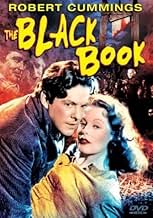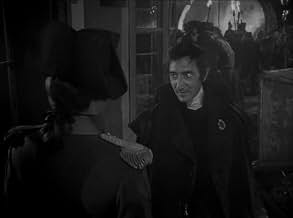Adicionar um enredo no seu idiomaRobespierrre, a powerful figure in the French revolution, is desperately looking for his black book, a death list of those marked for the guillotine.Robespierrre, a powerful figure in the French revolution, is desperately looking for his black book, a death list of those marked for the guillotine.Robespierrre, a powerful figure in the French revolution, is desperately looking for his black book, a death list of those marked for the guillotine.
- Direção
- Roteiristas
- Artistas
- Prêmios
- 1 vitória no total
- Citizen
- (não creditado)
- Robespierre's Shooter
- (não creditado)
- Citizen
- (não creditado)
- Citizen
- (não creditado)
- Bourdon
- (não creditado)
- Gatekeeper
- (não creditado)
- Saint Just's Sentry
- (não creditado)
- Danton
- (não creditado)
- Mme. Duval
- (não creditado)
Avaliações em destaque
From the first shot of a tiny distant rider silhouetted against massive lowering storm clouds, we are pulled into the mood of the film. The smallness of the rider is the smallness of the protagonist in the face of the overpowering events of the French Revolution. The use of light and shadow, the low shots and unusual closeups of actors: all of this made me feel I was in the hands of a master of his art. My breath was literally taken away by many of these images.
The story is serviceable and the acting quite good, but what sticks with me is the imagery of the film, the beauty of it.
The plot centers on Robespierre (a peruked Richard Basehart), who has embarked on a spree of mock trials and executions of his rivals in preparation to having himself proclaimed dictator; he's just disposed of Danton. A less than adulatory element loyal to the ideals of the newly formed Republic, but not to its current leaders, aims to stop him. One of their operatives (Robert Cummings) infiltrates Robespierre's inner circle by posing as the `butcher of Strasbourg,' a regional tyrant as bloodthirsty as Robespierre himself.
But in the circle of men closest to the power of the state, trust is a commodity in short supply; they watch their own backs and scheme to stab each others'. It's Cummings' job to negotiate this maze of duplicity and locate Robespierre's `black book,' in which he records neither his amatory conquests nor vintages he's sampled but his next victims. Exposure of this book will mean Robespierre's downfall. With the aid of proto-Bondgirl Arlene Dahl, Cummings races the clock in a round of near-fatal wild goose chases.
Reign of Terror remains a costumed adventure a chase movie but Mann paces it swiftly and slyly. And, fresh from some ground-breaking work in film noir, he and Alton give it a compellingly sinister look. Most period pieces are lit as if on the equator at high noon; this has to be the inkiest costume movie ever filmed (even Charles McGraw, as a bearded soldier of the Republic, goes all but unrecognizable). The darkness doesn't limit itself to the lighting the script, by Aeneas MacKenzie and Philip Yordan, rustles with ambiguous motives and queer twists. There's even an ironic note of premonition sounded at the end, when the slimy survivor Fouché (Arnold Moss), asks the name of a young soldier. `Bonaparte,' comes the answer. `Napoleon Bonaparte.'
At one time, the French Revolution (and the subsequent Napoleonic era) captivated numerous novelists and film-makers alike, and they could comfortably assume that their readers and audiences were familiar with historical figures like Robespierre, Danton, Barras, and the others of the period. In more recent decades, all this seems to have been replaced in the public's imagination by Hitler, the Nazis, and the other figures and events of the Second World War, but in many respects the history of France in the late 18th century and early 19th century is even more fascinating and compelling. And beyond a doubt, its impact still affects the world.
The scenario here has Robert Cummings impersonating a notorious public prosecutor, in order to get close to the bloodthirsty Robespierre, as part of an underground's desperate plans to replace Robespierre's tyranny with the more moderate influence of Barras and his party. The story is well-written, combining action, intrigue, and some Hitchcock-like touches with Robespierre's "Black Book", on which the fate of so many lives depends. Only the lack of a first-rate cast keeps it from being one of the best movies of its time and genre.
The best performances come from Arnold Moss, who is excellent as the slippery, conscience- free Fouché, and Arlene Dahl, who is appealing as the ex-lover of Cummings's character, with whom he has to work closely. The rest of the performances are all at least solid, but often miss the extra depth that could have raised the movie another notch.
Nevertheless, it all works quite well, and it's well worth seeing for its story, atmosphere, and for the intriguing period setting. It represents fine craftsmanship from director Anthony Mann and his cast and crew.
Você sabia?
- CuriosidadesShot on sets left over from Joana D'Arc (1948).
- Erros de gravaçãoIn a conversation with D'Aubigny, Robespierre states that he turned 36 years old in the month of May. However, during their Reign of Terror, the French revolutionaries changed many things, including the calendar. They discarded the traditional Gregorian calendar (January, February, etc.) in favor of a new, decimal-based system, and called it the French Republican Calendar . There were still 12 months, but now each month had 3 10-day weeks (for 30 days) and all of the months were re-named. What would have been the month of "May" in the Gregorian calendar was changed to "Prairial" in the new calendar. ("Prairial" translates to prairie or meadow.) So being a good revolutionary, Robespierre would have used this new calendar and not the old one when referring to dates. He should have said he "turned 36 years old in Prairial" and not "May."
- Citações
Maximilian Robespierre: There's a man in Strasbourg who isn't afraid of anything. A man named Duval.
Fouché: Duval?
Maximilian Robespierre: You know him?
Fouché: No, but I know his record. Five hundred executions in a single month. That's almost as good as yours, Max.
Maximilian Robespierre: I've sent for Duval. He arrives at the Blue Goose Inn tonight. You go there and bring him to the bakery. I'll meet him there.
Fouché: How will I know him?
Maximilian Robespierre: As one snake to another, you'll smell each other out.
- ConexõesEdited into Grand format: Amérique, notre histoire (2006)
Principais escolhas
- How long is Reign of Terror?Fornecido pela Alexa
Detalhes
- Data de lançamento
- País de origem
- Idioma
- Também conhecido como
- Reign of Terror
- Locações de filme
- Empresa de produção
- Consulte mais créditos da empresa na IMDbPro
- Tempo de duração1 hora 29 minutos
- Cor
- Proporção
- 1.37 : 1
Contribua para esta página



































